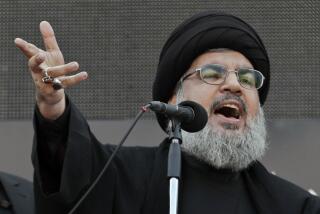Doctor, Strategist, Leader, Target
- Share via
JERUSALEM — Sixteen years ago, as the Palestinians’ first intifada was blazing its way through the tumbledown refugee camps of the Gaza Strip, a Palestinian pediatrician named Abdulaziz Rantisi set himself on the path that ended Saturday with his assassination at Israel’s hands.
Together with the frail but fiery cleric Sheik Ahmed Yassin, Rantisi became a founding member of the Islamic Resistance Movement, or Hamas.
Rantisi’s stature as one of the group’s original leaders, and as a close associate of Yassin, made it almost inevitable that he would be the one to take over when the sheik was killed by Israeli missiles less than four weeks ago.
That, in turn, made it all but certain that Israel would target him next, as soon as Hamas succeeded in carrying out another suicide attack.
On Saturday, it did, and Israel did.
Last month, poised to step into the leadership role, Rantisi professed not to care what fate held in store for him.
“I am not afraid,” he said then. “Because I believe the last day for me is not in the hands of [Israeli Prime Minister Ariel] Sharon, but in the hands of Allah.”
Throughout his years in Hamas, Rantisi never aspired to the kind of religious role played by Yassin. Nor did he have much to do with shaping the movement’s Islamist-inspired ideology of martyrdom. Instead, he was an intellectual force in the movement, a strategist who was cool and calculating to the point of being chilling.
Even after assuming the leadership role, Rantisi did not have the kind of following in the streets of Gaza that Yassin did.
Unlike Yassin’s, his was not a cult of personality.
In death, however, he inspired similar displays of frantic devotion. Hours after he was killed, young followers beat on the doors of the morgue where his scorched, shrapnel-torn body lay, hoping to catch a final glimpse of his face.
Like so many of the Palestinian refugees who ended up in the Gaza Strip, Rantisi was born within sight of it -- in the village of Yebna, just outside the coastal city of Ashkelon in what is now Israel.
He was less than a year old when Israel’s 1948 War of Independence erupted. The family fled the fighting and took shelter in the Khan Yunis refugee camp in the central Gaza Strip.
One of 12 brothers and sisters, he was determined to get an education. He managed to make his way to Egypt to study medicine, and came home to Khan Yunis to practice it, working as a pediatrician in the camp hospital.
But his involvement with Palestinian militant causes steadily deepened. Israeli authorities arrested him in 1983. Five years later, he was jailed again for his involvement in the nascent Hamas, an outgrowth of the Egypt-based Muslim Brotherhood.
Rantisi and his Hamas brethren shared another formative experience in 1992, when 400 of them were deported to Lebanon. There, under the influence of Shiite Muslim groups, they were exposed to extreme new techniques: Car bombs. Human bombs.
When he eventually was allowed to return to Gaza, Rantisi ran afoul of Yasser Arafat’s Palestinian Authority, which jailed him repeatedly.
But Hamas soon had the upper hand in Gaza.
When the current conflict broke out in September 2000, the group, with its tightly disciplined cells, moved quickly to the forefront. It was the driving force behind a campaign of suicide bombings in Israeli cities and towns -- a tactic so bloody and effective that it triggered a massive Israeli military retaliation in the West Bank.
Hamas’ popularity soared. Impoverished camp dwellers depended on the group’s network of clinics and hospitals, while its fighters looked to Yassin for inspiration.
Rantisi knew well what was expected of him in his stand-in role, and for a few short weeks, he provided it.
“We will fight them everywhere,” he told a roaring crowd of supporters days after Yassin’s death. “We will hunt them everywhere; we will strike them everywhere.”
More to Read
Sign up for Essential California
The most important California stories and recommendations in your inbox every morning.
You may occasionally receive promotional content from the Los Angeles Times.













